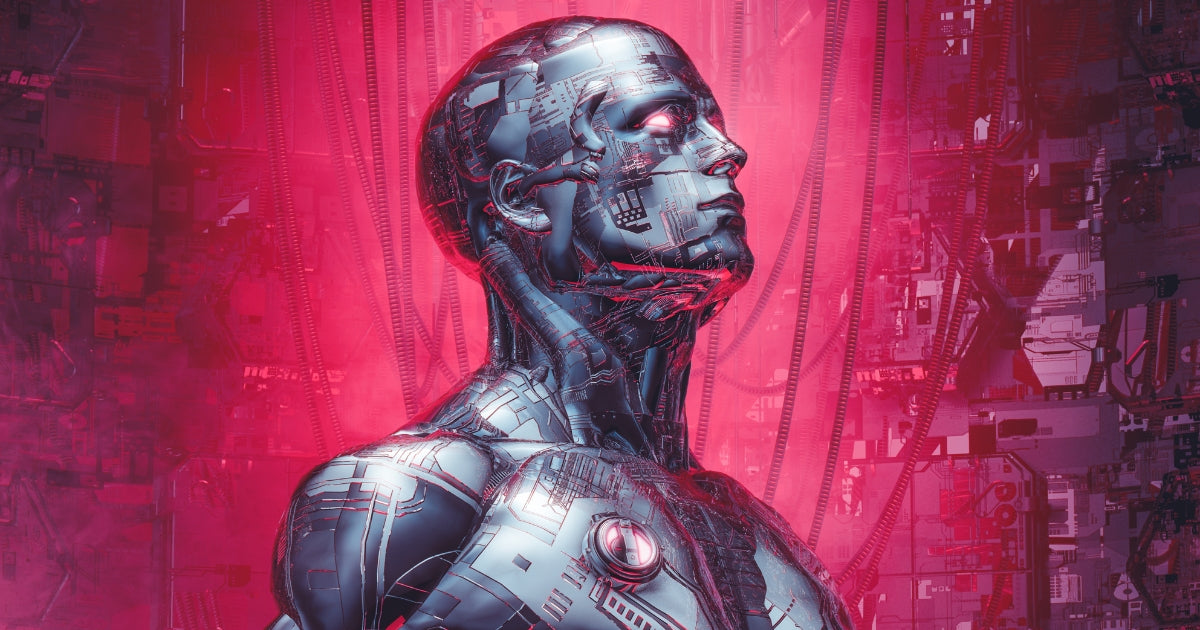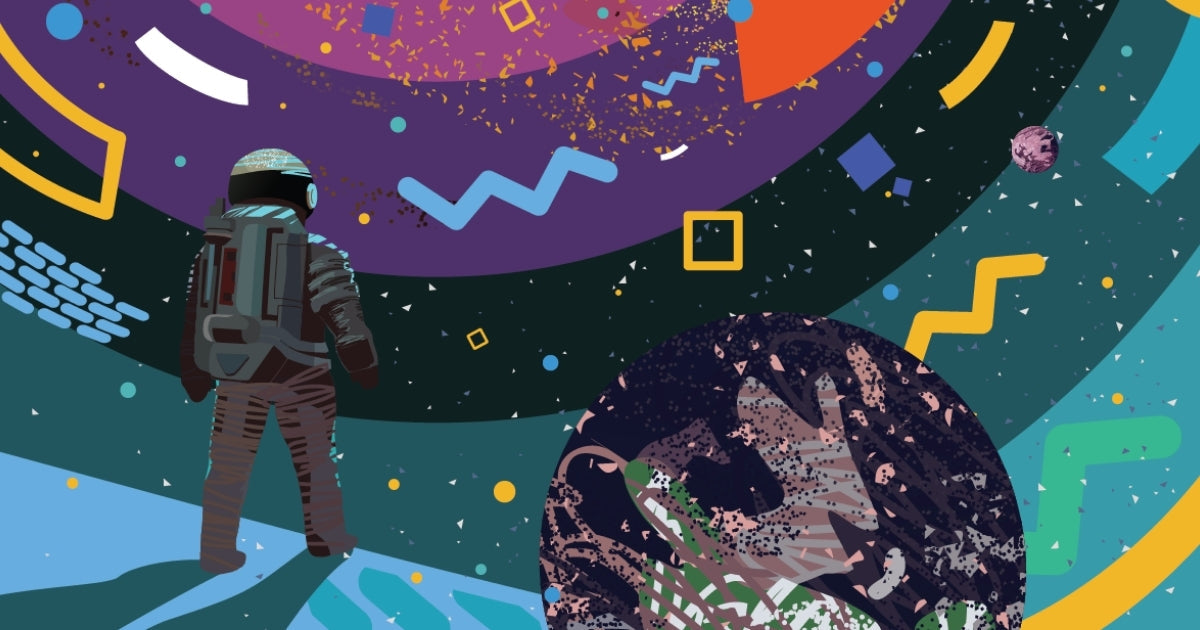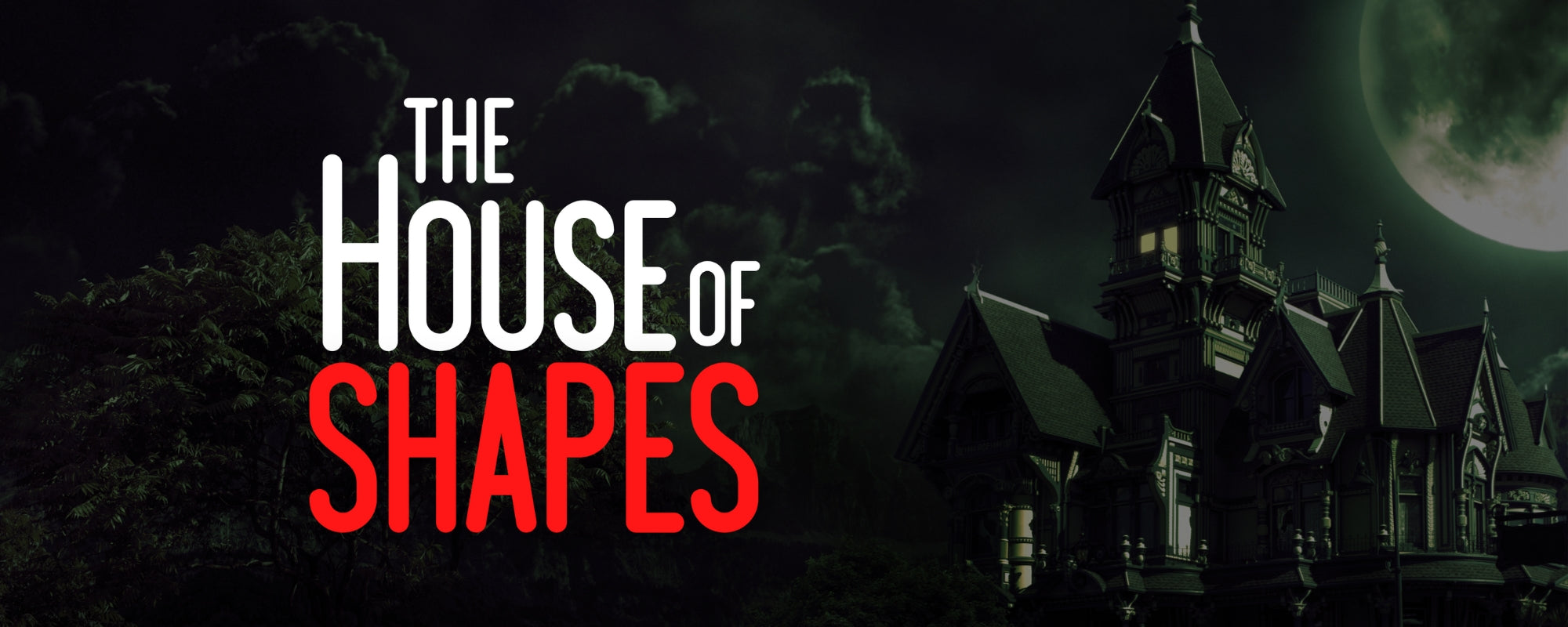
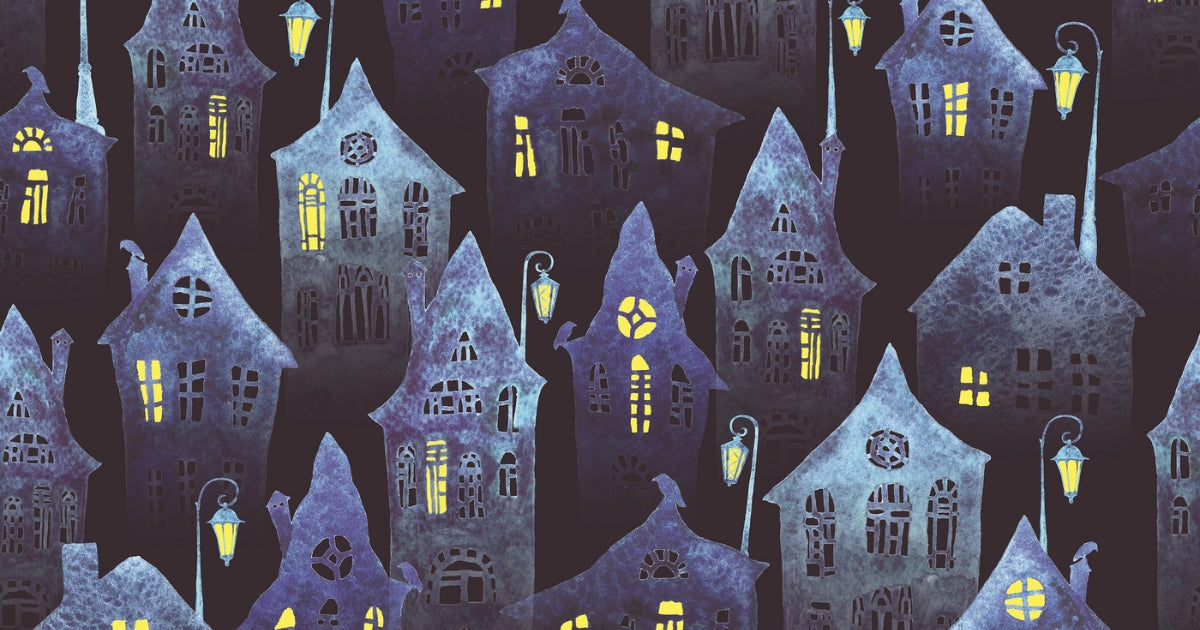
The House of Shapes
By Hailey Piper
Audio Narration by Piper Reese
Molly Cross had never hated a house before the Tawner house rotted overnight.
She spotted it while her father walked her up their neighborhood’s cracked sidewalk to the bus stop at lane’s end. He didn’t glance, his stiff neck aimed ahead, but Molly couldn’t tear her eyes away.
At last, he noticed her lagging. “What’s keeping you?”
Molly pointed.
“Tawner house? What of it?”
“It’s different now,” she said.
Every house on Marigold Lane grew on similar architectural bones, each coated in the same white plaster and auburn shingles. Even after the Tawners disappeared two months ago, their house hadn’t changed. Now, it slanted to one side, its graying plaster pockmarked with white fungus. What was once in rhythm with its neighbors had been eaten away by years since last evening.
Molly’s father huffed through his spiny black mustache. “What do you care? You’ll never live there. I swear, Molly, you’re only ever focused on the least important things. There you go; now you’re fixated on your shoes. See if that’ll make you faster so you don’t miss the bus. Hurry along, that’s a girl.”
It wasn’t her shoes, but the cement. Her father didn’t understand that some sidewalk cracks had to be studied before they were crossed. A teacher once told her, “Eagerness to understand is human nature.” Never in her life had Molly felt so naturally human.
What was her father then? He noticed the Tawner house’s change but didn’t care, didn’t hate, as if the elderly couple still lived there.
But no one lived there. Not even the house was alive, really. It festered in her head, like mental roadkill that stank across her thoughts at school, home, and in dreams, and she couldn’t think of it without hating it. The rot sprouted an idea the way dead things might help a tree to grow. She could ignore it no more than she could ignore that atrocity of a house. She was only human.
That house is dangerous, the Idea Tree told her. It has to go.
She pointed it out to her father each morning and afternoon through the week, hoping that he would grow an Idea Tree in his head, too, and then he’d understand. He only grunted and tugged her along.
Her mother only chastised. “You’re making your father late.”
They argued downstairs while Molly sat in her bedroom with her black telescope, a birthday gift now half a decade old. Most nights she knew which stars should appear over Marigold Lane, but tonight many seemed to avoid it, their distant light uncertain. The house could bend light and time. What was she supposed to do against a thing like that?
Her parents couldn’t help. The stars were as mysterious to them as she was.
“She could start walking herself,” her mother said. Molly could hear her voice through the floor.
“Can’t,” her father said. “She’d never make it. She isn’t like other kids.”
“We’re not the other kids’ parents. Other kids would stamp their feet and scream at how much you’re on her case. She’s a deep girl, with an old soul.”
They were noticing her humanness as if it were a problem. Local rooks swept the street in the evening, but like the stars tonight, they gathered anywhere that wasn’t the Tawner house. If starlight and birds were allowed to hate that house, why not Molly?
“Maybe she needs a more enriched environment,” her mother went on.
“Wonderful.” The sofa groaned beneath her father. “More money.”
“She’s not an investment. She’s our baby girl.”
“Back in the day, children were investments.”
Molly waited to hear them talk about the Tawner house, but they never did. Neither of them cared, and that would become a problem. She had learned about disease in school, how dead things spread maggots and bacteria to everything around. The Tawner house could one day again be in rhythm with its neighbors if it infected every home on Marigold Lane.
Her parents tried to distract her that weekend with a trip to the blacktop skate park, where other kids weaved and fell on skateboards and rollerblades. Her rollerblades were wobbly, uncertain. She abandoned them to follow birds in her socks and see if they avoided even the direction of the Tawner house until her father came scolding.
“Come learn to skate like the other kids,” he said. Her mother slapped his arm, but he was a tree, stiff and unyielding. To change might uproot him. Yet he expected Molly to bend, and her mother wouldn’t stand between them.
Molly, you’re a rubber band, they seemed to say. We’ll pull you any which way we like. They didn’t notice she’d been looped around her Idea Tree. Pulled far enough, she would snap back.
It wasn’t as if they did a good job hiding the gasoline.
The Idea Tree had it right. The Tawner house had to go. Splash the walls, burn it to the ground, and dance a merry jig around its smoking ashes.
She started up Marigold Lane with a yellow jerrycan full of gasoline and a box of matches. Against the evening sky, there was only the narrowest outline to suggest that the Tawner house could not reach infinite heights in the dark. She couldn’t blame herself for slowing at each trembling step. Even the stars quivered above the roof, their light bending just as they reached the street, as if to avoid the suburban corpse.
Its driveway lay only yards away when a fist closed around Molly’s arm and yanked her back, almost off her feet. Her father’s face burned with rage. “What do you think you’re doing?”
She couldn’t explain that sometimes people went alone to places they shouldn’t. “Will you help me?”
He dragged her home shaking his head, unburdened by a mental Tawner house and its insistent tree. “Back inside. Put that where you found it.”
He sent her to bed early, but there was no sleeping while he shouted downstairs. When the shouting eased beneath the groaning sofa, her father having settled to watch the news, her mother crept into the dark bedroom and sat at the edge of Molly’s bed.
“He might back off if you loosen up a little. I know you’re both the way you are, but maybe try doing things his way and he might see things yours.” She kissed Molly’s temple and closed the door on her way out.
It was unfair to expect Molly to be less human like her father. Why shouldn’t he be the one who tried? But saying that to her mother would only unify them against her.
She overheard him through the floor later that night. “It wasn’t supposed to be like this.” He sounded like he was crying.
If he cared, even a little, then he wasn’t hopeless. He just didn’t yet grasp the magnitude of the problem. Maybe it was unfair to keep pointing at the Tawner house and expecting her parents to get it. They needed this explained in careful steps.
Molly spent the next week preparing a large poster concerning healthy houses and a map of the neighborhood. She wrote notecards to explain dimensions and why they mattered. Whatever bent starlight in the third dimension had bent the house’s age in the fourth. Laid out like this, her parents might understand why the Tawner house needed a gasoline bath. There was something inside the house that made it sick.
Her father was kicking at her poor rollerblades when she brought her presentation to the living room. They would soon gather dust in her closet, alongside an old softball glove and bicycle helmet. Maybe when the Tawner house was an ash mound, she could do the things he liked, and he wouldn’t be so irritated with her anymore.
He didn’t listen through half her proposal before he lunged off the sofa and grasped her arm. “I’ve had enough,” he said, his voice arresting.
“Richard!” her mother hissed.
“We’re heading over there. Get your jacket, Molly. Throw it on along the way. That’s it, out the door. It’s a short walk.”
Her father dragged her down the sidewalk toward the monster’s mouth, trapped in his grip. He wouldn’t hear her. She would never be more than a nuisance, and feeding her to the Tawner house was the surest way to be rid of her.
Halfway there, she tugged her arm free and stumbled into the street. He grabbed for her but refused to chase her. To care that much would uproot him. He only glared at her with fiery eyes.
Molly watched him, her chest heaving. Behind him, the Tawner house loomed, an amorphous shape that approached in the dark. There were no stars to interrupt it, its promise of infinite height now made real. It was one with the night.
Her father turned its way. “Well, come on.”
She followed a few steps behind. She would have liked to see a tree on the Tawner lawn like the one in her head, but even the grass had died here. If only they’d brought gasoline, they could burn down the house and bring back the stars.
“Nothing to see,” her father said. “That’s what happens when a place is abandoned. No one lives here anymore.” He was about to turn home when the front door popped open. “Huh. So, they do still live here.”
Why couldn’t he think? Why was he so inhuman? He should have noticed that something was wrong.
He reached for her arm again. “We’re saying hello. Least you can do when you nearly burnt their house down. Think of it!”
He dragged her over the threshold and into the house. By the time she wrenched out of his grip again, the door had shut behind them. She didn’t try the knob. What she saw at the center of the living room paralyzed her.
Most of the room looked as expected—soft furniture, a brick fireplace. A collection of lighthouse paintings lined the walls.
But the thing sitting in the green chair by the fireplace did not belong. Here, Molly found the starlight. It had been eaten by the shifting yet vaguely humanoid rip in the air, and now it danced in this Shapeless Thing’s midnight body.
She knew it on sight. This was the thing that had twisted the Tawner house, and that had frightened away birds and starlight. Had it planted the Idea Tree? Molly couldn’t be sure. It was too alien to predict, like a cold patch of outer space given a seat on Marigold Lane. And if it could do all that, what else?
A black bulge grew from the Shapeless Thing and turned to her. “Come closer, Molly.”
It didn’t make noise, but Molly heard it, some shrill hum between her ears. She shook the sound from her head.
“A minute, will you?” Her father strafed the living room between Shapeless Thing and fireplace. He was as oblivious as the bricks. “I thought the kitchen was over there, and a hall here. They must’ve remodeled.”
“He doesn’t notice I exist,” the Shapeless Thing said. “Against his nature. Don’t be afraid. I’ve come to fix.”
“Fix?” Molly whispered.
The Shapeless Thing’s bulge quivered, almost a nod. “Made mess of the house on arrival. Trouble fixing at first. Fixed now. At morning, you’ll see. Good as new.”
“What happened to the people who lived here? Mrs. Tawner and her husband?”
Molly’s father entered the kitchen. “Good question,” he said.
“Herschel? Marina?”
The Shapeless Thing was quiet. It stretched toward the cold fireplace, as if watching something burn on extinguished logs. “Couldn’t fix,” it said. “Bands without rubber, understand? No stretch. They crumbled away.” Its upper half bent toward her and became cloudy. “But you’ll be fixed.”
“Fix me?” Molly asked.
“Yes. Fix you for your family.”
Molly looked herself over. The Shapeless Thing hadn’t aged her like the Tawner house or bent her like starlight. She looked back at it, confused.
“I’ll make you like the others.” The Shapeless Thing climbed from its seat. “He’ll like you. Love you. You’ll be ordinary. You said you would be. When the Tawner house is an ash mound? Good as new. You won’t notice it, or me, or the things I fix. You’ll be too happy and normal. You’ll like rollerblades.”
Molly glanced at the kitchen doorway. Her oblivious father still called for the Tawners. Now he peered through the back window. To be like him? She shook her head no.
But saying no wouldn’t stop the Shapeless Thing. It arched through the air between chair and Molly and burrowed into her head. “Happy family. Fixed family. Normal.”
Its weight on her thoughts drove her shrieking to her knees. “Don’t! It’s mine!”
“Not for long.” The Shapeless Thing found Molly’s obsession with sidewalk cracks and grabbed it with a blobby claw. Her interest crumpled into a paper ball. She couldn’t tell where the Shapeless Thing tossed it, only that it was gone. She no longer cared. “A relief to be fixed.”
Molly banged her forehead against the carpet. Too soft. She couldn’t shake loose the monster.
“Your love for stars,” it said, probing another interest. “That shouldn’t be too abnormal. Let’s find gasoline and burn it. Your disinterest in rollerblades—I’ll reshape it. Make it large. Fix it.”
“I don’t care!” Molly snapped. Her father shouted something at her. He couldn’t help. He didn’t even know that he was losing her. No, if the Shapeless Thing had its way, her father would be secretly satisfied at last. It would never cross his mind that something vile had crossed Molly’s thoughts in the Tawner house, only that he liked her better afterward.
The Shapeless Thing appeared on a lawn in her thoughts. “Ah, the famous Idea Tree. Fix your fixation on the Tawner house, but destruction is wasteful. I want to hear its whispers. Take its ideas, good as starlight. Mmm.” It grew a dozen arms to wrap around the Idea Tree’s trunk and then tugged to uproot it.
The tree wouldn’t budge. Maybe Molly and her father weren’t entirely unalike, both deep-rooted, unswaying trees.
The Shapeless Thing sprouted another dozen arms and reached into the earth of Molly’s thoughts. There shouldn’t have been pain—this was no physical place, so no nerves—but each tug felt like a hard yank on her spine. She turned inward, looked to the Tawner house in her head beside the Idea Tree, and then what she saw inside made her stop fighting.
The Shapeless Thing paused, too, and followed Molly’s thoughts. “How?”
Inside the Tawner house in Molly’s thoughts, another Molly lay on the living room floor. Another Shapeless Thing burrowed into her head. Mental equivalents, Molly realized.
The real Shapeless Thing abandoned the Idea Tree and peered into the mental Tawner house. “Is it broken?” It burrowed into the mental-Molly’s head, beside the mental-Shapeless Thing. Now two black shapes broke into her. A curious ripple ran through them.
Molly followed.
They descended from a starless sky, two drops of liquid darkness that snaked toward another mental Tawner house. Second level, Molly thought. Below, another Idea Tree, another mental-Molly, and another Shapeless Thing. The two became three and burrowed into another Molly.
“How can this be?” they asked together.
A voice thundered down the tower of mental-Tawner houses. “She’s a deep girl,” Molly’s mother had said. There was no answer from Molly’s father. He wasn’t here.
“It must end somewhere,” the Shapeless Things said. “There must be a bottom.”
They paused at the seventh mental-Molly, as if afraid.
But Molly dove in.
How deep would she go? Deep enough to be safe? Behind her, the Shapeless Things followed.
Another Molly, another Tawner house, another Idea Tree—more Shapeless Things becoming thinner as they descended. It wasn’t as shapeless as it liked to think, she realized. It ran thin now, anchored at one end in the real world, pulled at the other end deeper inside her thoughts, like a stretching rubber band.
And she didn’t think it could stretch forever. She descended faster, Molly after Molly.
“It’s me,” she said. “And me. And ME! AND ME AND ME AND ME–”
Snap.
The rubber band had stretched too far. It thinned, and thinned, and split apart.
Molly thrashed upright on the floor of the real Tawner house. Was she whole? She couldn’t tell. Her hands pawed at her head, but the Shapeless Thing wasn’t there.
It lay writhing on the carpet between Molly and the fireplace seat. Starlight flickered, stolen luminance being snuffed out piece by piece. If the Tawners were in there, Molly couldn’t see them.
“Fix,” the Shapeless Thing hummed. Air chewed at its sides, shrinking the space where the world had been pushed away. “Give the normal. Shape world. Nice world.”
Molly stared. She couldn’t fix this. She didn’t think she should want to.
Her father returned to the living room, still unaware of the dying thing at his feet. “Can’t make sense of it. You satisfied? Nothing strange to this place. You best let it go now.”
The Shapeless Thing jerked so that most of its blobby mass aimed at Molly’s father and then flung itself along the floor. If it burrowed into his head, tried to “fix” him, she wouldn’t have to wonder anymore exactly what became of the Tawners.
She grabbed at the Shapeless Thing. “You can’t!”
Her father scowled. “Can’t what? You don’t tell me what to do.”
The Shapeless Thing didn’t speak. A piercing whine stabbed Molly’s ears.
She gritted her teeth and tugged. “You can’t fix anything!”
The Shapeless Thing stopped fighting, and Molly dragged it on top of her. It was in her thoughts again, wriggling and teeming with fleeing starlight. The headache hit first, knocking Molly off her feet. Her skull felt full and near bursting.
And then the Shapeless Thing went supernova. A starlit storm blew through Molly’s thoughts, snapping her Idea Tree at the trunk and plowing over the mental Tawner house. Crumpled papers scattered in the wind, thoughts driven to gutters and wastelands. She couldn’t perceive the real Tawner house or her approaching father. Nothing he said made sense.
“Fix,” she said. “Fix?”
🏠
She awoke in her bed, her room dark. Her father must have carried her home after she had blacked out. She heard him through the floor. Her parents weren’t concerned about waking her.
“Didn’t think,” her father said. “Just a dizzy spell, but what if it hadn’t been? Last thing she’d know was her own dad bullying her.”
“Don’t beat yourself up,” her mother said.
“Like I forgot what was important. If anything ever happened to her–” He cut himself off.
Molly must have been too late to stop the Shapeless Thing entirely. It had touched her father, if only for a second, and changed something. He was lucky to be alive.
It must have come to Marigold Lane by mistake. There was nothing special here. Or maybe that was exactly why it came. To a Shapeless Thing from a shapeless place, this rigid street must’ve felt so different. Maybe it wanted to feel different. Molly would’ve liked to see its shapeless world.
“Tomorrow, we’ll have ice cream,” her father said below. “She’d like that.” He paused. “Or would she rather have frozen yogurt? It’s different, but she’s an odd duck.”
Molly’s mother laughed. “Try asking her for a change.”
Molly sat up. Her parents hadn’t come upstairs, but she could see them clear through the dark. Her mother was standing beside her seated father and was rubbing his back. He turned toward her, shoulders slumped, and they held each other. Molly not only saw them, but she felt their warmth, heard the songs of shame and relief, their feelings appearing to her like music. She didn’t need light to see them. The dark was no longer the absence of light, but a shape that filled the room in its stead.
And there was a greater darkness inside her.
Shaped thoughts that before could be crumpled now spread across infinite blackness, woven into nebulae and galaxies. Here, she found the stars. Unfixable, they formed and reformed in shapeless brilliance. They knew no limits. There was no bottom. Endless doors opened between the stars. Some reached through her walls, others through universes. Even the world of the Shapeless Thing seemed familiar, as if it had always been a part of her inner cosmic tapestry.
Her father was right about one thing—sidewalk cracks were not worth the bother when there were stars to see above. She could forgive her father for not having thoughts. In time, he might see her for herself, Molly of the stellar storms and cosmic vistas.
She sank deeper now. Or was this ascent? Within infinite shapeless space, with no up or down, she couldn’t be certain there was a difference.
And in that shapeless place, she too became shapeless.
Copyright © 2021 Hailey Piper
The Author
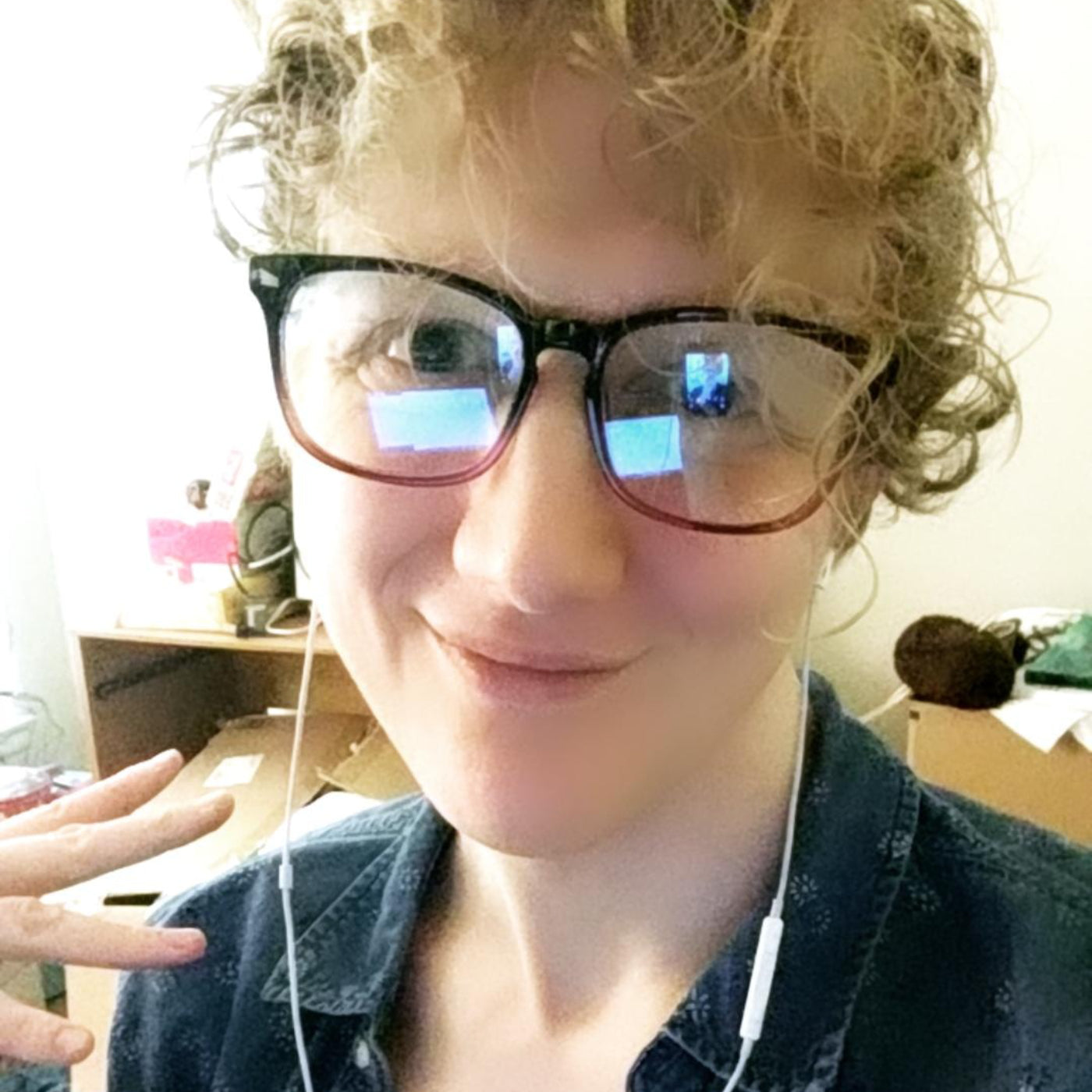
Hailey Piper
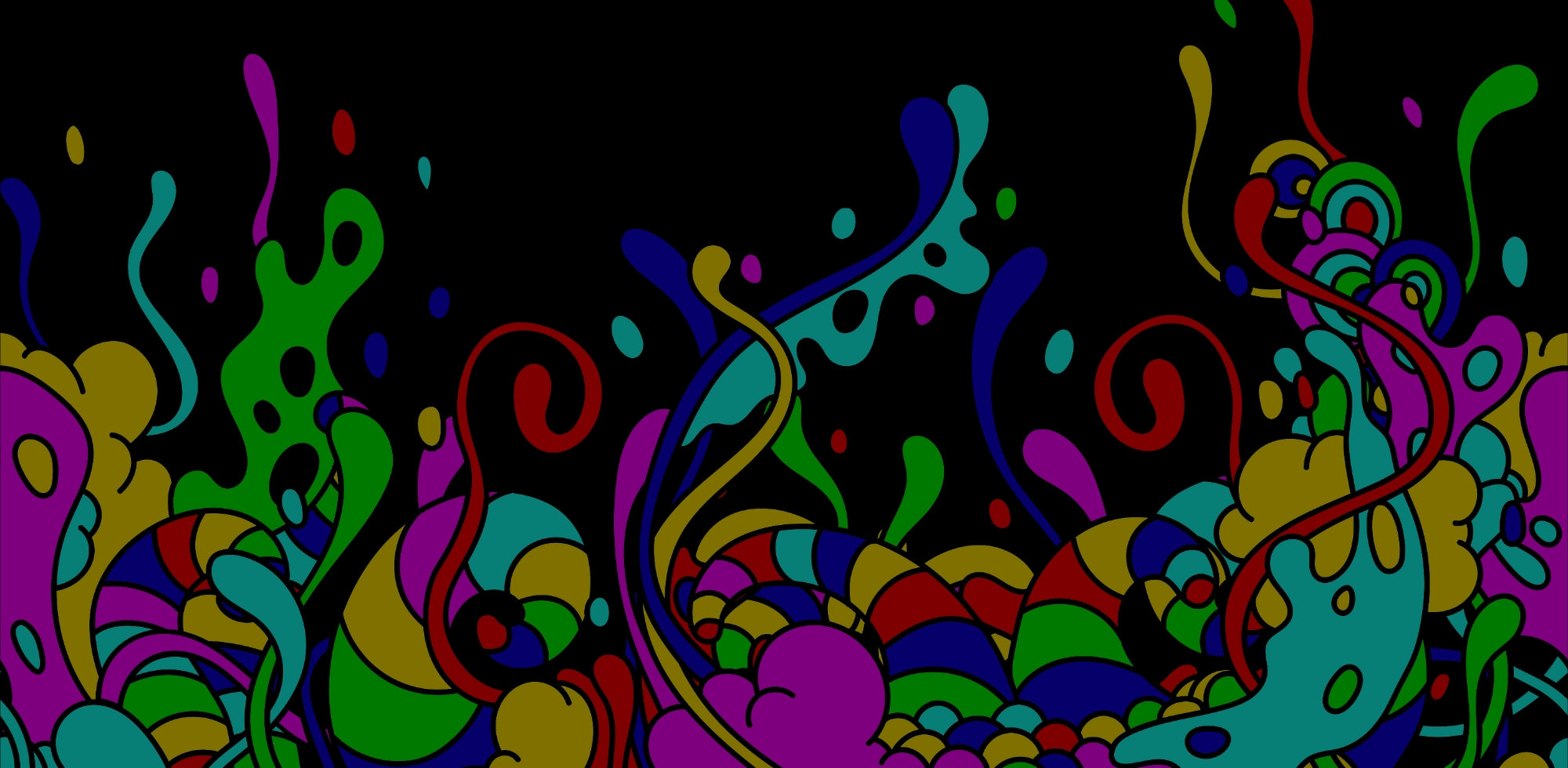
Subscribe to our newsletter
Promotions, new products, and sales. Directly to your inbox.


